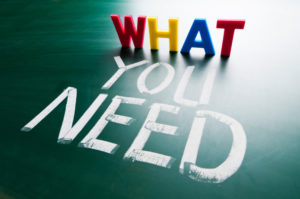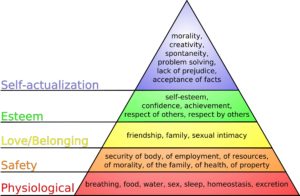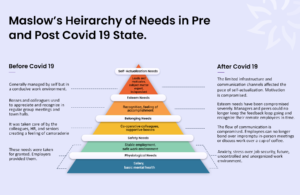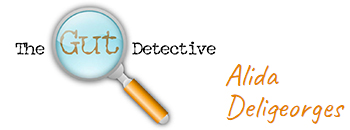
In our current uncertain climate, many of us may be feeling disconnected from our family and friends, whilst juggling home, work, and school commitments, inevitably impacting our stress levels and self-esteem.
How we cope during this time is based on how well we can adapt.
Abraham Maslow, a psychological theorist, developed a hierarchical representation of human needs and motivation in his 1943 paper “A Theory of Human Motivation” in Psychological Review.
He later explained in his book, “Motivation and Personality”, that individuals need to satisfy basic needs (such as food and shelter) in order to progress to higher-level growth needs. The feeling of frustration and uncertainty we are encountering in our daily lives can be linked to this theory.
Maslow’s Hierarchical Theory Of Human Needs
In short, Abraham Maslow’s theory argues that humans have a series of needs, some of which must be met before they can turn their attention toward others.
Maslow classifies the needs that humans need as follows:
- Physiological
- Safety
- Belonging and Love
- Esteem
- Self-Actualization
Maslow’s Hierarchy of Needs

The pyramid levels represent five categories of needs, with ‘higher’ needs being dependent on the satisfaction of ‘lower’ needs. Thus, based on this model, if your ‘lower’ needs are not met, then you’re not in a position to work on fulfilling your ‘higher’ needs.
The goal of a human being is to incrementally meet the needs of the individual levels so that they ‘complete the hierarchy’, so to speak.
The Hierarchy Levels
So what are the needs that are included in each level?
PHYSIOLOGICAL NEEDS
Needs that are biologically basic and almost primitive.
This includes:
– Air
– Sleep
– Water
– Food
– Shelter
These are first-order needs that must be met continuously for the individual to be satisfied. When they are not fulfilled, people become preoccupied with filling those needs above all else.
SAFETY NEEDS
The need to feel physically and emotionally safe from harm and genuine threats to ensure the physical survival of the person.
Safety includes things like physical security, employment security, confidence that the resources needed to meet the body’s needs will be achieved, and so on. In short, the person wants to be sure that their physical well-being is protected.
While safety needs are less immediate or demanding than the physiological needs, when one loses one’s job, family, home, life savings, health insurance, etc, one is likely to feel terribly insecure and unprotected. Fulfilling the safety needs might be likened to providing a bumper or airbags on a car; while you don’t always need them, having them gives you some confidence that you can face minor bumps and bruises along the road of life
According to Maslow, only when the needs included in the physiological and safety levels are met can someone attempt to do more on a day-to-day basis.
BELONGING AND LOVE NEEDS
The need to feel fully and unconditionally supported by someone else, and the need to provide such support and love to another.
It is the beginning of interpersonal relationships, and the overarching goal for meeting these needs is social belonging.
Such needs include both friendships, family relationships, and intimate relationships with a partner of choice. The specifics of these relationships vary – some seek larger social circles, while others are content with smaller ones.
Maslow argues that it is crucial for humans to love others and be loved by others. These connections get many people through the ups and downs of life. Having wider social connections and relationships are an important part of being happy. Lack of interactions, human relationships, and the sense of belonging may result in anxiety, depression, or loneliness while an abundance of love and community often sustain people through difficult times
ESTEEM NEEDS
The need to genuinely appreciate and respect oneself.
Maslow felt there was a clear distinction between love and respect or esteem. He felt that an ability to feel self-esteem and personal uniqueness sprung from being loved and embraced by families and communities. As individuals, we naturally wish to excel or be exceptional, to be noticed for our unique talents and capabilities. Once one has some measure of self-esteem and confidence, one gains the psychological freedom to be creative and to grow as well as to be more generous to others
Esteem can be described briefly as the ability for someone to be comfortable in their own skin. In addition to recognizing that they’re competent and worthy of respect, people want others to recognize their competence and respect them.
SELF-ACTUALIZATION NEEDS
The need to become the best version of yourself that you can be.
Maslow studied happy people in order to determine what it was that made them happy or self-actualized.
Maslow sums up this level as, “what a man can be, he must be.”
This level focuses on the person’s full potential and their ability to reach that potential, or the desire to accomplish all that one can to the best of one’s ability.
According to Maslow, self-actualizing people perceive reality accurately; they have a sense of awe, wonder, and gratitude about life. They are not self-centered but rather problem-centered and focus on how to improve and are not deficiency-centered. They are independent thinkers and are not overly influenced by the general culture. Their sense of humour is not sarcastic or hurtful but rather “life-affirming” with a philosophical sense of humour. They have a deeply felt sense of kinship with the human race.
What Effect Has The COVID Pandemic Had?
“Being a full human being is difficult, frightening, and problematic” ~ Abraham Maslow
As we head into 2020, many of us were achieving high levels of self-actualization, motivated to set and achieve goals to fulfill our full potential.
But the COVID outbreak and resultant worldwide pandemic, has knocked many of us, regardless of where we may have been ‘on the pyramid’ just a few months ago, to the bottom of the pyramid.

We can’t worry about higher-level needs when we’ve got physiological and safety needs that need to be addressed.
It is no wonder people have been panic buying and stockpiling basic supplies of food and medical supplies for their own use or even “just in case” they might need it. It is easy to understand some people’s need to first satisfy their physiological needs and those of safety and security, especially as the health crisis further leads to economic uncertainty and mass job loss, which contributes to additional feelings of vulnerability, insecurity, and acute stress.
How Do We Move Forward Together?
No matter which way you flip it when you consider a global health pandemic combined with major economic instability, it is not a “one size fits all” situation we are facing.
Each person will be impacted differently, either because they are working from different tiers of Maslow’s hierarchy to begin with, hence the growing frustration for those who have stockpiled, or circumstances beyond their control place them in a more highly vulnerable category, such as immune-suppressed or having elderly family members who rely on them to get their basic needs met. Or perhaps they have just been told they no longer have a job, which has ejected them into another tier of Maslow’s hierarchy overnight.
One thing is for sure, however: the negative judgement of others at this time does not help anyone, nor does it improve the situation. People make the best decisions they can for their own circumstances using the information and resources they have available to them at the time. It is probably natural to assume that most are feeling anxious at the moment due to certain needs not being met.
Patience, understanding, and kindness, however, are the way forward, as we are considerate of others, pay attention to specialist advice, and act as we are asked to by physically distancing ourselves from each other. This does not mean social distancing, as we are lucky enough to have multiple avenues to keep in touch via technology with our loved ones during this crisis.
We are a truly blessed generation who has had the lengthy luxury of being able to take health for granted for the most part, and we are used to a quick fix for almost everything due to gigantic leaps in medical research.
What is happening in the world right now is almost unfathomable. Why is there not a quick fix? We ‘must’ get on with things. We don’t want this inconvenient interruption to our otherwise over-packed lives. We have forgotten how to be patient. We have grown up with an abundance of everything. Opportunity, resources, technological advances have all been at our fingertips and our lives have grown increasingly busy. So, when people are asked to put their lives on pause momentarily for the greater good of all, some find this more inconvenient than others.
If we all act kindly toward each other and work to actively acknowledge the fear and panic surrounding the current situation, these feelings of anxiety become less oppressive and can be dealt with openly. People will begin to feel safer in their external environment, thus fostering healthy relationships, and understanding and meeting self-esteem needs. Self-actualization will follow along with a greater sense of purpose.
It is our only hope to conquer this and future pandemics.
To move through Maslow’s hierarchy of needs, we must utilize our evolved intelligence to be kind to each other, more selfless and less selfish, releasing the ‘free-for-all’ or ‘me’ mentality we have developed.
We must support each other and become ‘us’. And we must be brave.
**If you’ve got this far – thank you for reading and I look forward to bringing you more information in the future.
Now, enjoy some much-needed inspirational music to ease the stress – even just for a moment …
